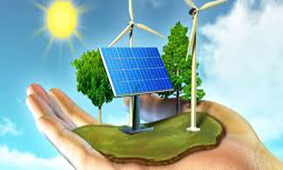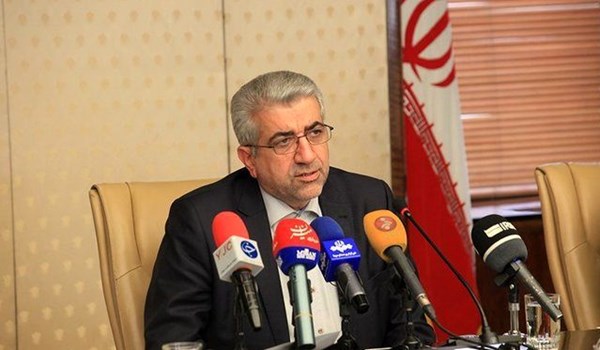
Iran Resolute to Increase Renewables Capacity


Ardakanian urged ministries and relevant bodies in the country to establish necessary cooperation and coordination in line with increasing capacity of new energies in the country.
He made the remark on the sidelines of the 11th Iran International Renewable Energy, Lighting & Energy Saving Exhibition, held in Tehran Permanent International Fairground on Feb. 21-24, 2019, in the presence of private sector activists entitled “Opportunities and Challenges of Development of Renewable Energies”.
The minister pointed to the development of renewable energies in the country and added, “Boosting new energies in the country requires coordination and cooperation of Renewable Energy Organization of Iran (SUNA), ministries of Oil and Energy and other responsible organizations.”
Earlier this month, Ardakanian said that the power generation of the country has increased by 11.4 times since the victory of the Islamic Revolution in 1979.
He said that Iran has moved up 24 ranks in terms of generation of electricity in the past forty years.
According to statistics, Iran’s rank of power generation in the world promoted from 38 to 14 and presently, the Ministry of Energy is exchanging electricity with its neighbors.
He made the remarks in a press briefing held at the venue of the Ministry of Energy where he evaluated the performance of his ministry in the past forty years.
“With coordination made in this regard, a contract will be inked between Iran and Iraq for exporting electricity from the Islamic Republic of Iran to this neighboring country in a three-year plan,” added the Iranian official.
This level of cooperation will include the construction of a power plant, modernization of power plants and reduction of power grid losses in Iraq as well, he maintained.
He drew a comparison between performance of the Ministry of Energy before and after the Islamic Revolution and said, “The power capacity installed hit from 7,000 megawatts electricity in early years of the Islamic Revolution to 80,000 megawatts, showing a considerable 11.4 fold hike.
Currently, suitable power generation capacity has been paved for the private sector companies working in the field of power industry, he said and emphasized that the number of power generation companies in the country hit from 65 in early years of the Islamic Revolution to 875, showing a significant increase.
Ardakanian reiterated that giant steps have presently been taken in the sector of electricity generation in the country which is incomparable to the early years of the Islamic Revolution.
Iran is currently supplying Iraq, Afghanistan and Pakistan with electricity, CEO of Tavanir Company Mohammad Hassan Motavallizadeh said on January 04, adding that the country is poised to double the volume of its power export to neighboring countries.
CEO of Tavanir Co., in charge of development of electric power generation, said that the bulk of electricity that Iran is currently exporting to other countries is too little compared to the generated volume, adding that the country presently has the potential to double the bulk of its exports.
Motavallizadeh said that Iran is currently exporting over 1,000MW electricity to neighboring countries, noting that the major importer of Iran’s electricity is Iraq, followed by Afghanistan and Pakistan.
He maintained that only a very small amount of generated electricity is being exported, adding that Iran can increase the bulk of its electricity exports if neighboring countries would like to place an order for more imports.
According to reports, it is predicted that Iran’s export of electricity would hit $33 billion by the Iranian calendar year of 1404 (March 21, 2025- March 20, 2026).
On December 31, Pakistan’s Minister for Power Omar Ayub Khan, in a meeting with Tehran’s Ambassador to Islamabad Mehdi Honardoost, underlined his country's willingness to import more electricity from Iran.
Ayub Khan said that Pakistan is ready to hold negotiations on the renewal of the agreement on 100MW electricity import to its border province of Baluchistan.
The two sides stressed the need to continue joint efforts in the power sector on both power generation and transmission.
Honardoost, for his part, noted that Iranian companies and contractors are ready to take part in the neighboring country’s power sector.
Last year, Iran expressed readiness to provide up to 3,000 MW electricity to Pakistan.
However, according to Ayub Khan, there is a problem on Pakistan side because importing such quantity of electricity requires a robust transmission system, which requires a lot of investment.


Trump weighs using $2 billion in CHIPS Act funding for critical minerals

Codelco cuts 2025 copper forecast after El Teniente mine collapse

Electra converts debt, launches $30M raise to jumpstart stalled cobalt refinery

Barrick’s Reko Diq in line for $410M ADB backing

Abcourt readies Sleeping Giant mill to pour first gold since 2014

Nevada army depot to serve as base for first US strategic minerals stockpile

SQM boosts lithium supply plans as prices flick higher

Viridis unveils 200Mt initial reserve for Brazil rare earth project

Tailings could meet much of US critical mineral demand – study

Kyrgyzstan kicks off underground gold mining at Kumtor

Kyrgyzstan kicks off underground gold mining at Kumtor

KoBold Metals granted lithium exploration rights in Congo

Freeport Indonesia to wrap up Gresik plant repairs by early September

Energy Fuels soars on Vulcan Elements partnership

Northern Dynasty sticks to proposal in battle to lift Pebble mine veto

Giustra-backed mining firm teams up with informal miners in Colombia

Critical Metals signs agreement to supply rare earth to US government-funded facility

China extends rare earth controls to imported material

Galan Lithium proceeds with $13M financing for Argentina project

Kyrgyzstan kicks off underground gold mining at Kumtor

Freeport Indonesia to wrap up Gresik plant repairs by early September

Energy Fuels soars on Vulcan Elements partnership

Northern Dynasty sticks to proposal in battle to lift Pebble mine veto

Giustra-backed mining firm teams up with informal miners in Colombia

Critical Metals signs agreement to supply rare earth to US government-funded facility

China extends rare earth controls to imported material

Galan Lithium proceeds with $13M financing for Argentina project

Silver price touches $39 as market weighs rate cut outlook

















